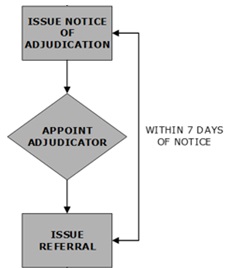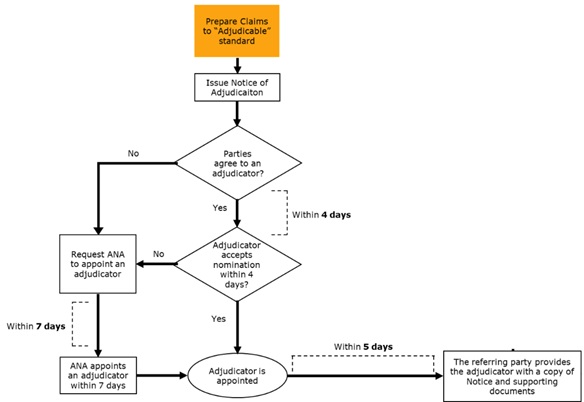Introduction
When I posted the Ontario adjudication flowchart on LinkedIn a few days ago, I thought it would be helpful to prepare a step-by-step review of some of the practical issues in adjudication.
This first article reviews the adjudicator appointment procedure and timeframe by comparing the schemes under the UK’s Housing Grants, Construction and Regeneration Act 1996 as amended (the UK Act) and the Ontario Construction Act 1990 as amended (the Ontario Act). Some practical tips are provided at the end for selecting an adjudicator by agreement.
Despite the general perception that the Ontario Act closely follows the adjudication provisions incorporated in the UK Act, there are certain distinct differences which may cause adjudication in Ontario to shape up differently, in terms of time and cost efficiency to say the least.
UK
The adjudication process in the UK is governed by the Housing Grants, Construction and Regeneration Act 1996 as amended by the Local Democracy, Economic Development and Construction Act 2009. The UK Act provides for a straightforward procedure in that the adjudicator is to be appointed, and the Referral (the supporting documents) is to be submitted, within seven days from the date that the Notice of Adjudication (the “Notice”) was issued, as shown below:

Under the scheme set out by the UK Act, the seven-day timeline for appointing an adjudicator and issuing the Referral and supporting documents starts on the date that the Notice is issued to the other party (Day 0). A number of different scenarios may occur during the seven day period; for example, if the parties have pre-agreed to an adjudicator, the Notice is sent to the nominated adjudicator on Day 0 who will have 2 days to confirm its acceptance. Failing that, the Referring Party sends the Notice to the Authorised Nominating Body (ANB) of choice to appoint an adjudicator. The UK Act allows 5 days for the ANB to appoint an adjudicator (5+2=7 days). As an alternative, where the parties do not have a pre-agreed adjudicator, they can start discussing a potential nomination while the Referring Party has requested the ANB to appoint an adjudicator. The parties can agree on the appointment of an adjudicator at any time until the ANB appoints one.
In any event, the general rule is that within seven days from the Notice issue date, the adjudicator is appointed, and the Referral is submitted. There are certain circumstances where the adjudicator’s appointment may be deferred; those circumstances are exceptional, which I will discuss in one of my future articles.
Ontario
The Ontario Act has set a procedure which has significant differences with its UK predecessor. Of particular note is the Ontario Act does not allow the parties to name an adjudicator in the contract. This means that the parties would likely start exchanging views on agreeing to the nomination of an adjudicator only after the Notice has been issued.
The flowchart below shows the procedure and timeframe for appointing an adjudicator set out by the Ontario Act.

A quick look at the flowchart above reveals that the nomination procedure under the Ontario Act is relatively sluggish and less straightforward. Under normal circumstances, it could take up to sixteen days from the Notice issue date until the Notice and the supporting documents reach the adjudicator’s hands, as opposed to seven days under the UK Act.
Time is available to the parties to agree to an adjudicator of choice, rather than requesting the ANA to appoint the adjudicator on their behalf. This would give the parties an opportunity to select an adjudicator who has a known track record and relevant experience. In the early days this may be more crucial, as adjudicators can only be selected from a limited list of adjudicators certified by the single Authorized Nominating Authority in Ontario (ODACC). Numbers are not known, but the intention seems to be not to flood the market with adjudicators.
Now, what can the Referring Party do to make the best use of the time available to appoint a mutually agreeable adjudicator?
The Ontario Act provides that “If an adjudicator does not consent to conduct the adjudication within four days after the notice of adjudication is given, the party who gave the notice shall request that the Authority appoint an adjudicator”. Prima Facie, this means that within four days the parties would have to agree to an adjudicator, inform the adjudicator of their wish to appoint him/her, and obtain his/her consent to conduct the adjudication; or otherwise, the Referring Party will be left with no choice but to request the ANA for an appointment. However, this does not necessarily mean that the parties have missed the chance of appointing an agreeable adjudicator at the end of day four.
In some cases, the four-day timeframe may be missed due to, for example, tardy feedback by the Defending Party or a late response by the sought-after adjudicator due to a long weekend. In such cases, where there is a genuine desire by the parties to agree to an adjudicator, the parties may still try and appoint an agreeable adjudicator via one of the following options:
- The parties continue the discussions while letting the four-day period lapse. This option is only recommended if the Referring Party sees a real chance that an agreement will be reached, although a few days late. Once an agreement is reached, a new Notice must be issued following which the agreeable adjudicator will be appointed.
- As an alternative, the Referring Party can request the ANA to appoint an adjudicator at the end of the four-day period, while continuing the efforts towards selecting and appointing an-agreeable adjudicator. If the parties manage to appoint the adjudicator prior to the ANA making such appointment, the Referring Party will inform the ANA that an appointment has already been made.
It is recommended that the parties actively engage in appointment-by-agreement, as they would otherwise be running the risk of having little or no control over the adjudicator selection process. A good and fair decision/determination usually comes with a good adjudicator with relevant experience.
Ali Fard - Driver Trett Canada
Driver Trett has more than 20 years’ experience in successfully helping its clients with adjudication.